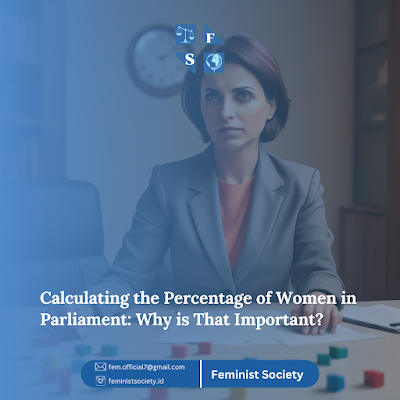Efer Musa Tamungku
 |
| Women's representation in parliament is crucial to achieve inclusivity in the law-making process. |
Feminist Society - All political contests in Indonesia from various periods show that women's involvement in parliamentary seats tends to be less than men, this provides evidence that there is still a gender gap between women and men in politics. This social life phenomenon is common, especially concerning basic rights between men and women, there is a gap that is proven by the patriarchal life system that is still rooted in which men are considered more dominant than women in various aspects of life. Conditions like this give rise to injustice towards women.
The issue of gender disparity in
representative institutions or parliaments is still a concern in several
countries, including Australia. Australia was the first country to recognize
the right to vote and sit in parliament in 1902 after the enactment of the
Commonwealth Franchise Act 1902 (IPU, Women's Suffrage).
The Commonwealth Franchise Act 1902
was the law that gave most Australian women the right to vote in Australian
federal elections. The act stated that all persons not under the age of
twenty-one years, whether married or unmarried, who had resided in Australia
for 6 (six) months continuously and who were indigenous or non-residents who
had acquired citizenship as determined by the monarch, were entitled to vote
and be elected in Australian federal elections.
This provides concrete facts that
developed countries in implementing the concept of legal development that
places equal rights regardless of gender can make their countries advanced. The
Inter-Parliamentary Union reported that on October 1, 2017, the ratio of women
to men who became members of the Indonesian parliament was still below the
world average where Indonesia was ranked 100.
Basically, Indonesia has the spirit
to fight for women's political rights as marked by the ratification of the
Convention on the Elimination of All Forms of Discrimination Against Women
(CEDAW). This agreement is considered as the International Charter of Rights
for Women which was established by the United Nations (UN) in 1979 and came
into force in 1981.
The basic principle mandated in
CEDAW is that the participating countries of this international convention are
obliged to ensure equality or equal participation between women and men in
various fields such as politics, economics, social, culture and civil. It is
stated in Article 7 of the convention that participating countries must take
action to guarantee political rights for women such as the right to vote and be
elected in general elections and the right to participate in the formulation of
government policies.
Women's representation in
legislative elections in Indonesia is regulated in Law Number 7 of 2017
concerning General Elections, where women's political rights are channeled
through political parties, this channeling can be done through women's
participation in building a political party or becoming part of a political
party. Although women's representation in parliament continues to show an
increase in each legislative election, the 30% threshold as mandated in the
Election Law has not been met. This is one of the problems that must be
immediately resolved.
You can also read: The Importance of Women's Participation in Politics
The need to increase women's
representation can be accommodated in Politics as reflected in Law No. 7 of
2017 concerning General Elections. Article 245 states that the list of
prospective DPR and DPRD candidates submitted by political parties must contain
at least 30 percent female representation. The consequence of the concept of
women's representation in parliament is a form of coercive regulation, because
there is a disqualification mechanism as an election participant if the
management at the central level of women does not meet the 30% quota.
The regulation provides
instructions to force political parties to meet a minimum quota of 30% women.
In principle, there are four reasons why women's quotas in elections are
important. First, it demands the principle of justice for men and women.
Second, it offers a role model for the success of female politicians. Third, it
identifies the special interests of women that are not visible. Fourth, it
emphasizes the differences in women's relationships with politics, while also
showing their presence in improving the quality of politics. This mechanism is
a form of Go Politics from women, not only as an activity to enter the process,
mechanism, institution, and political system (crafting democracy) but also as a
form of participation in women's political representation that is able to
expand the constituent base (broadening base). In this effort, affirmative
action is important for building women's political strategies.
In the future, it is hoped that the
30% threshold mechanism for women's representation as members of the People's
Representative Council can be fulfilled purely and consistently, in order to
realize an inclusive political system through optimal women's representation in
parliament.
If you are interested in issues
related to gender equality and in-depth discussion about feminism, let's join
with Feminist Society. Feminist Society aims to promote progress in gender
equality and women’s rights activism through education and advocacy. To get
related articles, please visit the page https://feminist-society.blogspot.com/.
You can also contact us on:
Instagram : @feministsociety.id
Email : fem.official7@gmail.com
View More:
The Law Number 7 of 2017 concerning
General Elections.
Azizah Ratu Buana Khan & Ruli
Agustin. The Judicialization of Politics on the Testing of the Constitutionality
of the Age Limits of Presidential and Vice Presidential Candidates by the
Constitutional Court. Journal of Law, Politic, and Humanities. Volume 4. Number
4. (2024). https://dinastires.org/JLPH/article/view/433




No comments:
Post a Comment